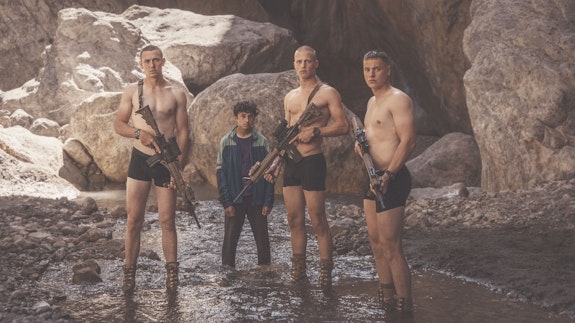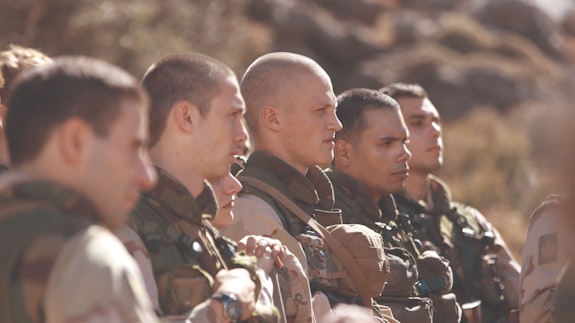Film
Shariff Korver’s Do Not Hesitate (2021)
A small-scale war film that explores the international dimensions of the War on Terror.

Music forms a sonic spine to the Dutch-language film Do Not Hesitate (2021), the second feature from Venezuelan-born director Shariff Korver, one of the entrants in the Tribeca Film Festival’s International Narrative Competition. Like many war films, Do Not Hesitate pays homage to Apocalypse Now (1979). The film’s three Dutch soldiers, stranded by their broken-down armored personnel carrier in an unnamed West Asian country, set their stereo to an orchestral recording of Richard Wagner’s “Ride of the Valkyries.” But that musical cue, forever associated in film history with the helicopter assault sequence in Francis Ford Coppola’s Vietnam War masterpiece, is quickly replaced by an EDM rendition of the song. The European soldiers, at first skeptical of the traditional version of Wagner, find the modern remix more appealing. They begin to dance.
The musical quotation suggests that this is not your father’s war film, but it’s still a war film, part of a long and inescapable tradition. The homage also underpins at least one aspect of the film’s apparent thesis, that the modern quagmire in Afghanistan is just another iteration of the failed mission in Vietnam.
The film follows the wartime experience of Erik (Joes Brauers), a soldier in the Dutch army stationed somewhere in West Asia. Erik, who plays the drums at his parents’ house in the Netherlands, is seen constantly tapping his fingers. Throughout the film, Ella van der Woude and Juho Nurmela’s minimalist and percussive score echoes the beats Erik seems to hear in his head, providing insight into his state of mind as he confronts the difficult decisions that await him when he is left in command.
After Erik’s troop carrier, on patrol in the occupied country’s barren wilderness, breaks an axle in a ditch, the Dutch troops are stranded. Paranoid and frustrated while they wait for orders, Erik sees movement in the brush and fires his rifle. But the intruder he dispatches is only a goat, and it’s not long before a local boy (Omar Alwan) appears and demands compensation for his murdered property.

As the troops split up in advance of a scheduled helicopter rescue, Erik and two others, the loyal Roy (Spencer Bogaert) and cruel Thomas (Tobias Kersloot) are left behind. But the local boy, despite receiving 50 dollars for his goat, lurks about the broken vehicle. Though Thomas is antagonistic to the boy, Erik is kind and tries to communicate with him in a futile use of English. Despite Erik’s gestures, the boy remains exceedingly difficult and ferocious in his dislike of the Dutch soldiers.
What follows is a tense suspense story, as the three soldiers hide from scavenging locals and desperately search for water in a forbidding cave. It’s a story that, in less sophisticated hands, might have gravitated toward a more sentimental ending in which Erik and the boy form an unlikely bond in spite of their differences. But Do Not Hesitate is unflinching, and a particularly dark twist near the end of its runtime sends the film toward more compelling and disturbing territory. A final act predominantly set in a Crete disco explores war’s aftereffects on the veterans of the mission.
In a Q&A session recorded to accompany the 2021 Tribeca festival screening, Korver said in 2011 he had read a Netherlands newspaper article about how Dutch troops used to recuperate in Greece for a few days following their deployment to Afghanistan, but the program backfired when it turned out many of the soldiers had difficulty being back in the West, leading to fights and various misconduct.
“Somehow this article grabbed me and resonated with me,” Korver said. “I went on to make another film before, and during the edit of that film, I went back to this story, and [thought] my next movie should be about this story.”
Though Greece was part of the real-life inspiration for the film, Nadim Carlsen’s cinematography ironically takes advantage of the Hellenic countryside’s rugged and portentous landscape as a stand-in for the Afghanistan-esque country. In particular, a sequence at a water-filled cave is framed with an eye toward mystery, a location that promises joy and violence, and delivers both.
With the exception of several explosive moments, Jolein Laarman’s screenplay offers restrained insight into the characters of the soldiers increasingly tested by their circumstances. The credibility of the actors as soldiers is amplified by the military training the actors reportedly received before photography began.
The dynamic between Erik and the unnamed mountain boy forms the crux of the film, and both actors do their part to define that relationship as tenuous but filled with compelling parallels—both are young men tarnished by war. As the boy, Alwan’s ability to pivot from quiet moments to outbursts justifies the paranoia and suspicion his character instills in the three Dutch soldiers. Meanwhile, Brauers’s expressive performance as Erik forms a strong counterpoint to Alwan’s. Over the course of the film, Brauers’s shaved head and his riveting face, which vacillates from innocence, to turmoil, and finally to corruption, is by the end reminiscent of Marlon Brando’s bald Colonel Kurtz in the conclusion of Apocalypse Now.
Through one lens, the uneasy and perilous relationship between the boy and the soldiers might serve to represent the ambiguous relationship between the Western armies of “liberation” in West Asia and the hardy village peoples they have been sent to “protect.”
A promising entry for the careers of a young international team of talent, Do Not Hesitate aims for the weight of a parable and comes close to that vaunted mark, a film that would form a nice double feature with Sam Mendes’s Jarhead (2005), about the gradual transformation of a young recruit in the US Marines (Jake Gyllenhaal) during the first Gulf War.
Do Not Hesitate is a fitting release for the current geopolitical moment, with the complete US withdrawal in Afghanistan set for September 11, 2021. The film serves as a reminder that the War on Terror has not only been a burden on America and the countries the US has occupied in the name of fighting terrorism, but that these conflicts have also left lasting physical and psychological wounds in the soldiers of allied countries as well. Though the war in Afghanistan is ending, cinematic interpretation of the modern conflict has only just begun, a struggle that Do Not Hesitate rightfully argues is as global and international as the War on Terror itself.

